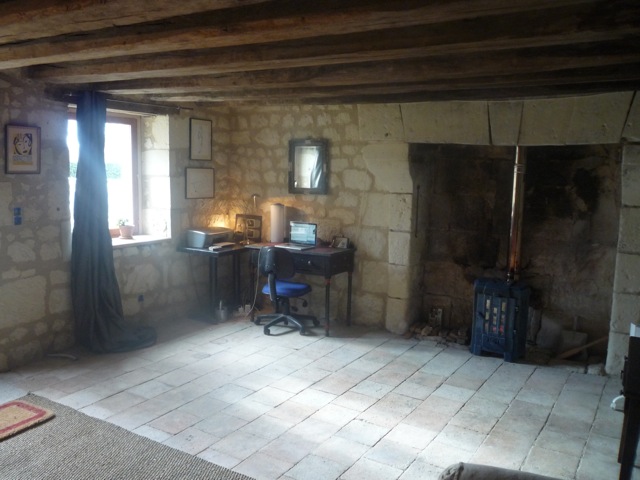A Writing Life: Place

My office is a tiny 200+ year old building that used to be a bakery, standing across our yard from my house.
I wrote my first two books in bed. Not because I found it tiring or needed frequent naps in between chapters or anything. It’s just that there wasn’t a better place to do it. From time to time I would run away to a friend’s empty home and spend an intensive four or five days typing my fingers off. But usually it was me, propped up with my laptop in the upstairs guest bedroom, waving to my father-in-law and other construction workers through the glass panes in the door as they came and went doing renovations on our farmhouse. I could see them shaking their heads, wondering what the strange foreigner was doing acting like an invalid on her days off from teaching at the university.
And then I got published. And they stopped shaking their heads and got to work renovating a little house on our property for me to use as my writing hideout. The building served as the neighborhood bakery (boulangerie, in French) a couple of hundred years ago, and then was used as a shelter for seasonal field workers…and their horses. (Half of the floor is in earthen tiles, the other half is dirt, and embedded in the wall over the dirt part is a metal ring to tether a horse.) Then, for at least the last half-century, it was used as a storage shed.
I had to wait until a family of birds moved out and shoo away a lot of mice before it was even usable. But now I’ve got electricity and a wireless connection (beamed over from our house) and a wood-burning stove to keep the place reasonably warm – if I sit directly in front of it with my laptop on my lap – during the winter.
It is a haven for me. It is the place I come to conceive ideas. As well as carry them to term and give birth to them. (To push the metaphor right over the edge of acceptability, the two drawings to the left of my desk are me when I was pregnant, sketched by the amazing Chuck Bowdish.) It is a womblike place. Especially when I draw the black-out curtains over the door and window and get the fire roaring.
There is a book on writing that I really love entitled, appropriately, “On Writing” by Stephen King. I had read a couple of other guides to writing over the years, but found them either too worryingly melodramatic or transcendentally vague. Stephen King actually gives specific advice about how to write, where to write, how much to try to produce, and other concrete tips. He told me what I really wanted to know – facts that other writers either thought were too trivial or too personal to divulge.
And what he said about “place” really made sense to me. He suggests writing in the same place every day. “The space can be humble…and it really needs only one thing: a door which you are willing to shut.” He suggests no telephone, TV or video games in the room, and drawing the curtains or pulling the shades unless the window looks out at a blank wall. Check, check, and check.
I admit it would be nice to have a bathroom handy instead of having to run across the yard through the elements, but I’m not complaining because I am so grateful for what I already have. King said he wrote his first two published novels “in the laundry room of a doublewide trailer, pounding away on my wife’s portable Olivetti typewriter and balancing a child’s desk on my thighs.” He says that John Cheever wrote in the basement of his Park Avenue apartment building, near the furnace. After those examples, a toilet doesn’t seen terribly important.
For me, it’s all about getting away from The Everyday. If I’m in our house, I’m going to find a million little things — besides writing — that I really should be doing. In The Boulangerie I can sit at my desk or lay on the floor or lounge on the couch – but these are my only choices – there are no other distractions. All I can do is sit and think and write.









